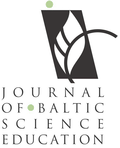EDUCATIONAL EFFECTIVENESS OF THE 5E MODEL FOR SCIENTIFIC ACHIEVEMENT OF STUDENTS WITH HEARING IMPAIRMENT
| Title | EDUCATIONAL EFFECTIVENESS OF THE 5E MODEL FOR SCIENTIFIC ACHIEVEMENT OF STUDENTS WITH HEARING IMPAIRMENT |
| Publication Type | Journal Article |
| Year of Publication | 2017 |
| Authors | Parveen, Z |
| Journal | Journal of Baltic Science Education |
| Volume | 16 |
| Issue | 5 |
| Start Page | 723-732 |
| Pagination | Continuous |
| Date Published | October/2017 |
| Type of Article | Original article |
| ISSN | 1648-3898 |
| Other Numbers | E-ISSN 2538-7138 |
| Keywords | 5E Model, hearing impairment, scientific achievement |
| Abstract | This experimental research aimed to find the effectiveness of the 5E model of education for achievement in science among students with hearing impairment at the elementary level. An instructional package was developed following the 5E model for one unit from a science subject in grade VIII. A science test was developed by the researcher to test the achievement of students of grade VIII with hearing impairment. This test was validated by experts, pilot tested, subjected to item analysis and the reliability of the test was calculated. The test with 38 items was used as a pre-test and post-test during the study. Thirty-four students of grade VIII were selected from a school and were random assigned to two groups. One group was randomly assigned as the experimental group and the other served as the control group. The research followed a pre-test-post-test control group design. The performance of both groups was compared to evaluate the effectiveness of instructions based on the 5E model. A significant improvement was found in the performance of the experimental group as compared to the control group. It was concluded that hearing impaired children can perform better in science if they are taught through approaches promoting construction of knowledge, such as in the 5E model. |
| URL | http://oaji.net/articles/2017/987-1509214017.pdf |
| DOI | 10.33225/jbse/17.16.723 |
| Refereed Designation | Refereed |
| Full Text |
